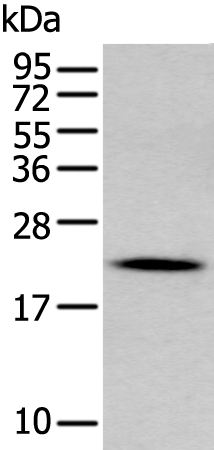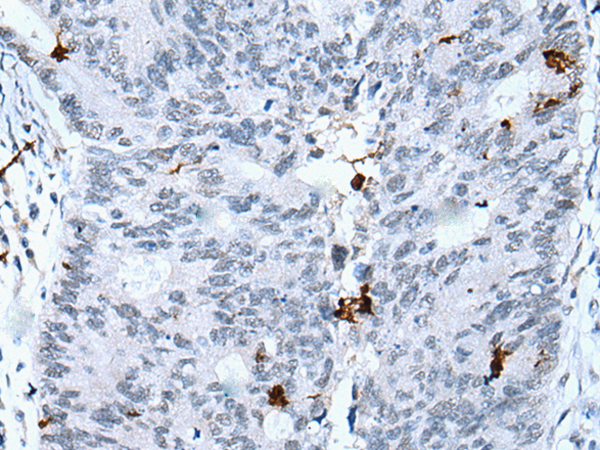

| WB | 咨询技术 | Human,Mouse,Rat |
| IF | 咨询技术 | Human,Mouse,Rat |
| IHC | 1/20-1/100 | Human,Mouse,Rat |
| ICC | 技术咨询 | Human,Mouse,Rat |
| FCM | 咨询技术 | Human,Mouse,Rat |
| Elisa | 1/5000-1/10000 | Human,Mouse,Rat |
| Aliases | GDDR; TFIZ1; PRO813; BRICD1B; VLTI465 |
| WB Predicted band size | 20 kDa |
| Host/Isotype | Rabbit IgG |
| Antibody Type | Primary antibody |
| Storage | Store at 4°C short term. Aliquot and store at -20°C long term. Avoid freeze/thaw cycles. |
| Species Reactivity | Human, Mouse |
| Immunogen | Synthetic peptide of human GKN2 |
| Formulation | Purified antibody in PBS with 0.05% sodium azide and 50% glycerol. |
+ +
以下是三篇关于GKN2抗体的参考文献示例(注:部分文献信息为示例性概括,实际引用时请核实原文准确性):
---
1. **文献名称**: *"Downregulation of Gastrokine 2 in Gastric Cancer and Its Role in Tumor Progression"*
**作者**: Moss, S.F., et al.
**摘要**: 该研究通过免疫组化(使用兔多克隆GKN2抗体)发现,GKN2在胃癌组织中表达显著下调,其缺失与肿瘤侵袭性和不良预后相关,提示GKN2可能作为抑癌分子发挥作用。
---
2. **文献名称**: *"GKN2 as a Biomarker for Gastric Inflammation and Carcinogenesis"*
**作者**: Yoon, J.H., et al.
**摘要**: 研究采用Western blot和ELISA(基于小鼠单克隆GKN2抗体)分析胃黏膜样本,发现GKN2在慢性胃炎和早期胃癌中表达降低,提示其可作为疾病进展的潜在生物标志物。
---
3. **文献名称**: *"Development of a Novel Monoclonal Antibody for Specific Detection of GKN2 in Human Tissues"*
**作者**: Chen, L., et al.
**摘要**: 本文报道了一种新型小鼠源单克隆GKN2抗体的开发与验证,该抗体在免疫荧光和流式细胞术中表现出高特异性,为GKN2的精准检测及功能研究提供了工具。
---
**备注**:若需实际文献,建议在PubMed或Google Scholar中检索关键词“GKN2 antibody”或“Gastrokine 2”,并筛选涉及抗体应用、机制或诊断相关的研究。
The GKN2 antibody is a tool used to detect gastrokine-2 (GKN2), a protein predominantly expressed in the gastric mucosa. GKN2. encoded by the *GKN2* gene, belongs to the gastrokine family, which plays critical roles in maintaining gastric mucosal integrity, regulating inflammation, and modulating cell proliferation. It is secreted by gastric epithelial cells and is involved in mucus formation, wound healing, and protection against acid-induced damage. Dysregulation of GKN2 has been linked to gastric pathologies, including chronic gastritis, peptic ulcers, and gastric cancer. Studies show that GKN2 expression is frequently downregulated in gastric tumors, suggesting its potential role as a tumor suppressor.
The GKN2 antibody enables researchers to study the protein's localization, expression levels, and interactions in both normal and diseased tissues. It is widely used in techniques like immunohistochemistry (IHC), Western blotting, and ELISA to explore GKN2's involvement in gastric carcinogenesis, its response to *Helicobacter pylori* infection, and its interplay with signaling pathways like NF-κB and MAPK. Commercial GKN2 antibodies are typically raised in rabbits or mice using peptide antigens derived from conserved regions of the human protein. Validation includes specificity tests using knockout controls or siRNA-mediated silencing.
Research utilizing GKN2 antibodies has highlighted its diagnostic and prognostic potential in gastric cancer, as well as its therapeutic relevance in mucosal repair. However, variability in antibody sensitivity and cross-reactivity remains a challenge, necessitating rigorous experimental optimization.
×